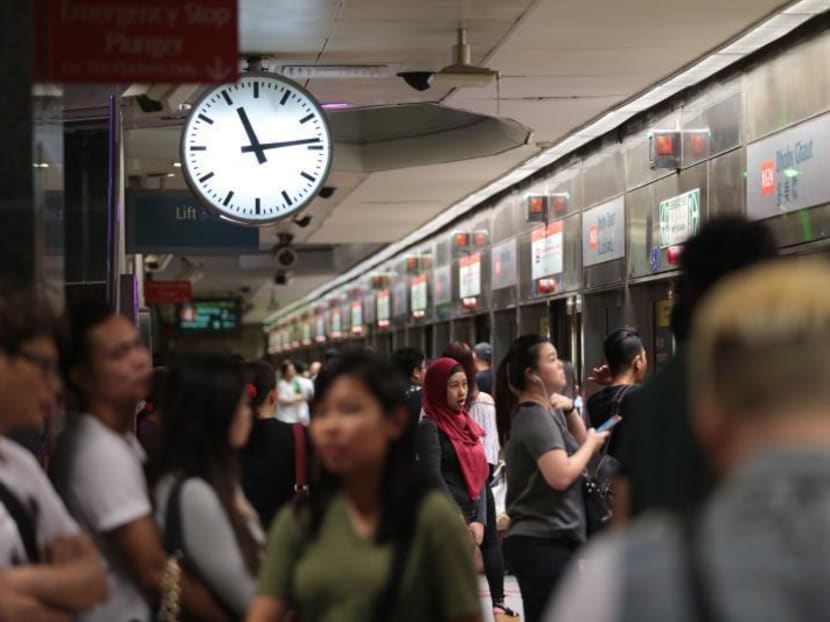Concerns raised over SMRT’s corporate culture, system of checks
SINGAPORE — In light of the serious lapse in SMRT’s maintenance regime, corporate governance experts are expressing concern over its corporate culture, given that public scrutiny on rail reliability has intensified in recent years, and there were tell-tale signs of weaknesses it did not catch.
SINGAPORE — In light of the serious lapse in SMRT’s maintenance regime, corporate governance experts are expressing concern over its corporate culture, given that public scrutiny on rail reliability has intensified in recent years, and there were tell-tale signs of weaknesses it did not catch.
For example, on days when maintenance were to be carried out, there were no records showing requests for track access.
Associate Professor Mak Yuen Teen, from the Department of Accounting at NUS Business School, said: “Given the reliability issues that have plagued SMRT for such a long time, I would have expected a laser focus of the organisation on maintenance. This should include internal audits reviewing policies, procedures and controls relating to maintenance and compliance with them.”
He added: “There is certainly a concern with corporate culture, and whether there is sufficient emphasis on factors other than financial performance and efficiency, and whether reporting to management and the board... covers factors relating to maintenance, safety, etc.”
On Tuesday (Oct 31), SMRT released the initial results of an internal investigation into the flooding of tunnels at Bishan MRT Station after a downpour on Oct 7. Train services on the North-South Line were down for more than 20 hours.
It was found that the crew responsible for maintaining the pumps at the station had signed off and submitted maintenance records for nearly a year, without carrying out the works. Records did not indicate that the pumps were activated during maintenance last December and in March and June this year, nor were there records to show that approvals were given for the crew to get on the tracks.
AUDITS MAY NOT UNCOVER ALL PROBLEMS
Dr Lawrence Loh, director of the Centre for Governance, Institutions and Organisations at NUS Business School, said that things may have gone undetected because audits are typically “not 100 per cent comprehensive”, but often a “sampling” of problem spots.
“Have they (acquired) a very thorough mechanism to know which are some of the most unlikely places (where problems could occur), but could have a very high impact?” he asked.
“You have to know where the hotspots or the floodgates are. You need to know the places where big disasters can happen or something significant, such as assets or life, can be affected. Then, of course, your audit attention might be stronger in that area,” Dr Loh said. “In this case, nobody knew that one little omission in checking one little pump can cause a 20-hour disruption affecting a quarter million people.”
Commenting on the findings, Singapore Management University’s Toru Yoshikawa said they are indicative that it was not a priority for SMRT’s top management and board to review its system of checks and internal audits.
The professor of strategic management at Lee Kong Chian School of Business raised two examples of recent scandals involving Japan’s second-biggest automaker Nissan and its third-biggest steelmaker Kobe Steel.
Last month, Nissan addressed inappropriate inspection practices that had been going on in the company for at least 20 years, and called for a suspension of the domestic vehicle production.
Earlier that month, Kobe Steel said that its staff members had falsified data about the strength and durability of some aluminium and copper products used in planes, trains and, potentially, a space rocket.
Dr Yoshikawa said that these firms did not follow the quality procedure for a long time and the problem was not made public for just as long.
SAME ISSUE WITH OTHER TEAMS?
Member of Parliament Lim Biow Chuan, a member of the Government Parliamentary Committee (GPC) for Transport, said that the latest discovery by SMRT is “very stunning”.
“If you are tasked to do a job, you must do it properly. To say that you have done it, when you have not done it, that’s sad. That’s very sad,” he said. “I would think this should trigger a more thorough audit... If it happens to one team, you got to check whether the other teams have the same issue.”
While making an apology to the public on Oct 16, SMRT’s president and group chief executive officer Desmond Kuek admitted that there are “deep-seated cultural issues” within the company that have contributed to major train disruptions since 2011.
Giving his view on the issue, Member of Parliament Yee Chia Hsing, who is also part of the GPC for Transport, said: “I think (SMRT has) relied on good faith that (its) people would carry out their duties. Unfortunately, these people didn’t do what they were supposed to do. So, definitely, good faith is not good enough.”
In order to step up maintenance, Mr Yee suggested that SMRT staff members who are tasked to maintain systems at one station could be deployed to other stations to “cross-check” the work of their colleagues.












